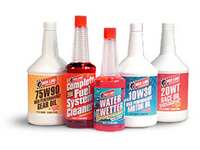Top 5 Summer Road Trip Tech Tips
 |
AS TEMPERATURES CLIMB AND AMERICANS HIT THE ROAD THIS WEEKEND, MAKE SURE YOUR CAR, RV OR TOW VEHICLE IS TRAVEL-READY WITH THESE TIPS FROM RED LINE
BENICIA, CA - July 2, 2009: Research conducted by AAA shows that the July 4th weekend is consistently the busiest time of year for road travel in the United States, and 37.1 million Americas will hit the road this coming weekend. Weather forecasts show much of the county will experience high humidity and triple-digit temperatures, creating a potentially dangerous combination for unprepared vehicles. With that in mind, the experts at Red Line Oil have created a Road Trip Checklist to make sure your car is ready for the long haul.
1. Inspect your tires. Tires should be properly inflated to the pressure
listed in your owner's manual, sidewalls should be clear without
checking or cracks, and there should be at least 1/16-inch of tread
left. Also make sure your spare is inflated.
2. Check your cooling system. Many modern cars often have long-life
coolant engineered to last up to 100,000 miles; older cars and RVs need
to have the coolant changed more frequently. Make sure the radiator is
full (check while engine is cold), and the overflow tank should be
filled to its indicator line. All hoses should be firm and dry. If the
level is low, try using distilled water to prevent scale and mineral
buildup.
3. For added insurance, try a bottle of Red Line's WatterWetter(R),
designed to keep the coolant temperature from climbing when challenged.
This product can lower temps as much as 20 degrees F by increasing the
"wetting ability" of the water that comes in contact with your engine.
Think of it as "road trip insurance" for cars on road trips, tow
vehicles and RVs.
4. Check your oil. Many owners forget to check the level between oil
changes. Make sure your oil level is full, and for longer drain
intervals switch to a top-quality, ester-based synthetic. Red Line's
fully-synthetic motor oils provide the highest protection, cleanliness
and superior drain intervals with the lowest friction for your gasoline
or diesel engine. Also note that you can add a quart of synthetic to
conventional oils without issue.
5. Check your transmission fluid level. Most automatics have a dipstick
clearly labeled in the engine compartment. Fluid should be full and
clean (clear red, not brown or black). Manual transmissions should be
serviced at intervals recommended in your owner's manual. When having
your transmission serviced, consider using a fully-synthetic fluid like
Red Line for increased durability and wear protection. Also ensure that
the fluid you select is just right for your vehicle.
Celebrating its 30th anniversary, Red Line Synthetic Oil Corp. manufactures more than 100 quality products for the automotive, racing, motorcycle, marine and industrial markets. Its complete line includes a wide variety of motor oils, gear oils, additives, and greases. For more information, please visit www.RedLineOil.com or contact Red Line Synthetic Oil Corp., 6100 Egret Court, Benicia, CA 94510.


